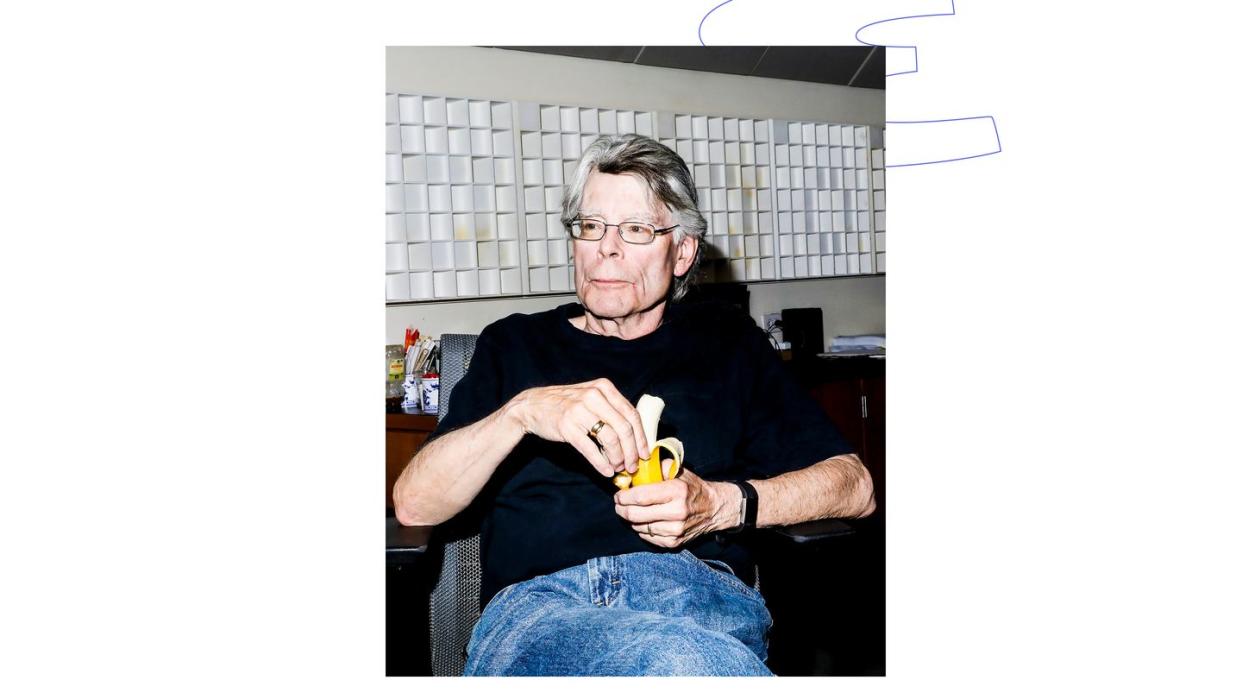What I’ve Learned: Stephen King

- Oops!Something went wrong.Please try again later.
Fifty years ago, Stephen King published Carrie, a slim volume about a bullied teenager and the violent revenge she exacts on her high school classmates. Seventy-six books later, King is arguably the most famous writer in America. Through bloodcurdling novels like It, Pet Sematary, and The Shining, the author has carved out his place as the undisputed master of horror fiction. With more than 350 million copies sold and many of his books adapted for the screen (sometimes multiple times over), King’s dark imagination is a dominant force in American culture. Now seventy-six years old, he still writes at a brisk clip from his home in Bangor, Maine. His latest, You Like It Darker, is out now.
Fame is a pain in the ass. The older you get, the more of a pain in the ass it is. But you have to realize that it comes with the territory. It’s just part of what you do.
There’s this old Spanish saying: “God says, ‘Take what you want and pay for it.’ ” That’s the case with being famous.
I knew a lot when I was seventeen. But since then, it’s been a constant process of attrition.
You can’t think of writing as an adult pursuit or anything that’s important. That’s a good way to turn into a gasbag and start to think that you’re really fucking important. You’re not. You just do your work.
I have to work every day because I have to keep it fresh. If you take a few days off, it all starts to look kind of tacky—like an old campaign poster that’s running in the rain.
It doesn’t always work. I’ve got stories that just ram up against a brick wall. They’re in my right desk drawer. I don’t look in there.
If it’s a good review, it can be dismissed. If it’s a bad review, well, then that’s something you obsess over a little bit.
The important thing about failing is that it should always be a learning experience.
When I have a good idea, I just know. It’s like if you have a bunch of cut-glass goblets set up and you’re hitting them with a spoon. Clunk, clunk, clunk. And then one goes ding.
In every marriage, after the shine is off, then you get down to the serious work of building a relationship.
You can’t let the sun go down on your anger. These all sound like fucking platitudes. They become platitudes for a reason.
Be there for your kids. Say yes. Say yes as much as you can.
What would I tell my twenty-year-old self? Stay away from dope and stay away from booze. Because you have a tendency to go too far.
I’ve been in recovery a day at a time for a long time now. All I know is what works for me: staying out of the wine aisle in Publix.
They say that you don’t go to a whorehouse to listen to the piano player, and if you hang around the barbershop, sooner or later you’re going to get your hair cut. So I try to stay away from temptation.
This article appeared in the Summer 2024 issue of Esquire
SUBSCRIBE
I like to use my imagination. I like to go for walks. I dig the world in general.
Ten percent of my tweets are political because every now and then, I just get so irritated about something. It doesn’t change anybody’s mind, but it’s good to be able to say it. In the meetings that I go to, we say, “You have to claim your chair.” Sometimes I feel like, yeah, I have to claim my chair.
There’s this saying that if you’re not a liberal in your teens, you don’t have a heart, and if you’re still a liberal in your twenties and thirties, you don’t have a brain.
I think that, actually, if you’re a liberal in your teens, you probably don’t have a brain. And if you’re not a liberal by the time you’re in your thirties and forties, you don’t have a heart.
If you ask what I learned from my accident, it would be: Number one, stay on the sidewalk. I was walking in the country, and the guy came over the hill and hit me.
Other than that, you learn about pain. But it doesn’t do any good, because you forget. The body has a way of forgetting the trauma. I suffered a lot, and the writing helped me because it took me away. That’s probably a healthy thing. You don’t want to live your life in a defensive crouch.
I can cook fish a thousand different ways, but I’m also one hell of a breakfast cook. I make a great cheese omelet.
I’d like to be known as somebody who died merry—who did his work as best as he could and was decent to other people.
I think what people will say is “This is the scary guy—the guy who wrote the horror novels.” But I’d like to be known as somebody who was just a decent human being.
You Might Also Like

